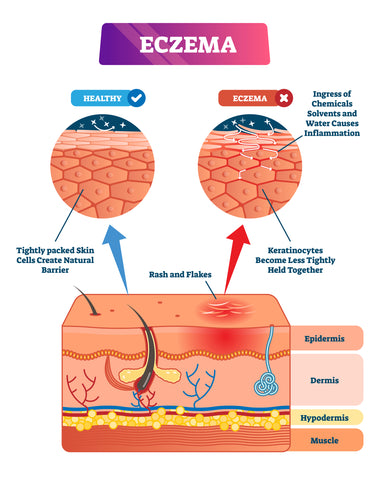How Mountain Ice Eczema Cream Can Manage Eczema Flare-Ups
Eczema, or atopic dermatitis, is a group of medical conditions that cause inflamed, irritated skin. It affects around 35 million Americans every year, including 10 percent of women ages 20 to 45, and 10 to 20 percent of infants. The disease requires careful management to handle flare ups, including awareness of individual eczema triggers and finding the right treatment methods, such as Mountain Ice Eczema Cream.
What are the Symptoms of Eczema?
No matter which part of the skin is affected, eczema is almost always itchy. Sometimes itching will begin before any visible symptoms! Many people will develop a rash, most commonly on the face, back of the knees, wrists, hands, or feet.
Affected areas of the skin usually appear extremely dry, thick, or scaly. Depending on the tone of one's skin, the rash may initially begin to look red in color, but then turn brown. Or, if a person has a darker skin tone, eczema can affect pigmentation, making the affected area lighter or darker.

What Causes Eczema?
The exact cause of eczema is unknown, but researchers believe that it is linked to an overactive response by the body's immune system. This autoimmune view of eczema is potentially supported by the disease commonly occurring in families with a history of allergy issues and asthma. Some doctors also say that defects in the skin barrier could force out moisture and trap germs in, causing irritation.
Eczema Triggers
Sometimes flare-ups of eczema occur in response to certain conditions or exposure to certain substances. These can include:
- Extreme temperatures: hot temperatures; cold and dry environments.
- Certain clothing materials: often wool or synthetic fabrics.
- Certain household products: such as soap and laundry detergent.
- Allergens: animal dander, dust mites, pollen, mold.
- Food allergies.
- Hormonal changes: eczema can worsen for women during pregnancy or in the days immediately before their period.
- Skin infections.
For some patients, upper respiratory infections, colds, or stress may trigger the condition, or cause eczema to worsen.

Preventing Eczema
Eczema outbreaks can be avoided or severely lessened by taking the following precautions:
- Frequently moisturizing skin.
- Avoiding temperature or humidity extremes.
- Avoiding excessive sweating or becoming overheated.
- Avoiding scratchy, rough clothing materials, like wool.
- Using gentle soaps, detergents, and solvents.
- Avoiding foods you're allergic to.
- Reducing stress.
Treating Eczema with Mountain Ice Eczema Cream
Mountain Ice Eczema Cream is an advanced formula that hydrates, restores, and rebalances the lipid layer of the skin. These epidermal lipids play an essential role in the skin's barrier, retaining moisture and protecting against dryness and inflammation. Our formula contains a unique lipid concentrate that moisturizes the skin while repairing the damage caused by harmful irritants. The skin's barrier is vital for healthy skin. Mountain Ice Eczema Cream replenishes and strengthens that barrier.
Click this link to try a sample pack of NEW Mountain Ice Eczema Cream!




